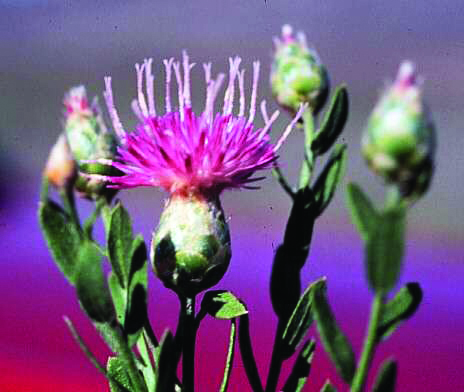
BY BLAINE BUG CREW
Noxious weeds such as spotted knapweed have been a problem for a long time. People have been wondering how to get rid of it. Most people use deadly chemicals such as Roundup. This can severely impact the earth and development of infants and children. However, there is a better, safer way to rid areas of these harmful weeds. Insects such as Cyphocleonus achates are helping reduce the populations of the knapweed plants.
Spotted knapweed, Centaurea maculosa, is an herbaceous, short-lived perennial that reproduces entirely by seed. A plant may produce up to 25,000 seeds. Seeds are brown to black in color, smooth, and less than 0.25 inches long, and can remain viable in the soil for eight years. Flowers range in color from pink to light-purple and bloom from July to October. The flower head bracts are black-tipped, giving the plant its characteristic “spotted” appearance. Stems are typically 2 to 3 feet tall with lower leaves that are deeply lobed and upper leaves that are more linear. Spotted knapweed ranges from moist rangeland habitats to abandoned areas. Thirteen biological control agents have been approved for release for the knapweed complex, which includes spotted knapweed.
Cyphocleonus achates is a robust biological control agent that can attack spotted (preferred host) and diffuse knapweeds. Cyphocleonus achates overwinter as larvae in roots, where they mine the vascular tissue and reduce knapweed density. Cyphocleonus achates adults emerge from June to mid-September and feed on knapweed leaves. The adults are 0.5 to 0.6 inches long and generally live eight to 15 weeks. Each female deposits more than 100 eggs during her lifetime. Eggs hatch in 10 to 12 days and larvae begin feeding on roots.
The benefits of these bugs are becoming more and more recognized as a viable way to rid us of noxious weeds. With bug crew we help others rid their properties and communities of these harmful weeds. Spotted knapweed is harmful to both the environment and animals. This is where the bugs come in. They provide a noninvasive and nontoxic way of helping our environment and planet.
With more expansion and education of the public, we can find even more ways to save our environment in a clean and healthy way. If you want more information please contact the Blaine County Weed Department at 208-788-5543.


